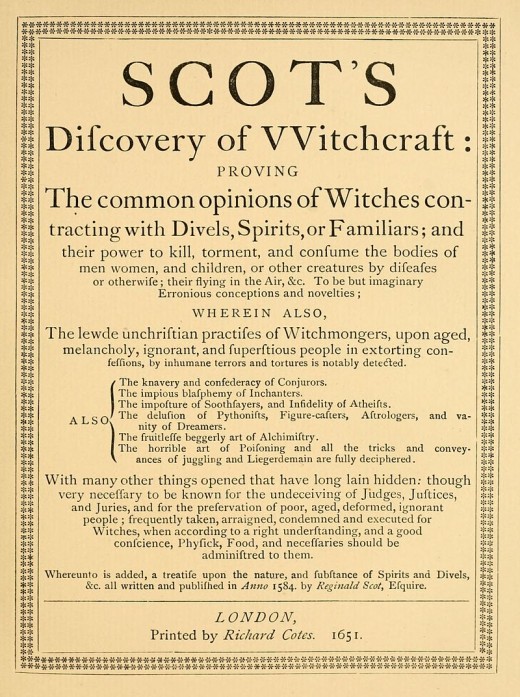"The Discoverie of Witchcraft": a Book by Reginald Scot

Reginald Scot
Reginald Scot (1538-99) was an English country gentleman who was educated at Hart Hall, Oxford (which later became Hertford College). He spent most of his adult life managing his family estate, although he did spend a short time as a Member of Parliament.
He was a member of the Church of England (i.e. a Protestant), although he was affiliated to a small sect known as the Family of Love, which taught that the Devil influence people by psychological and not physical means. It was this belief that led to his scepticism regarding the reality of witchcraft.
The Book
First published in 1584, The Discoverie of Witchcraft ran to nearly 700 pages, and included many woodcut illustrations.
The 16 sections began with Scot’s outline of contemporary beliefs about witchcraft before moving on to a systematic discrediting of those beliefs.
The later sections moved on to descriptions of magic tricks, given that these were often seen by contemporaries as evidence of witchcraft being practiced. By exposing the work of conjurers as trickery and not devilish magic, Scot hoped to counter the evidence that was often brought against supposed witches, although conjuring itself was also illegal in England under a law passed in 1542.
Controversy
It was a highly controversial work in which Scot argued against the very existence of witchcraft, arguing that a belief in witches and magic was unchristian. At the time, witchcraft was recognized as a crime, so the book was considered to be heretical when it was published. However, it can now be seen as a radical and forward-thinking exposé.
Scot blamed the Roman Catholic church for fostering paranoia and fuelling the witch-hunts that were taking place at that time and which resulted in many innocent people (mainly women) being sentenced to death – which usually took the form of hanging and not burning at the stake, as is generally believed.
Scot took the far-sighted view that people who claimed to have witnessed witchcraft, and people who confessed to being witches, were suffering from a psychological disorder.
The book was vilified by King James VI of Scotland, who later (in 1603) became King James I of England. James was a convinced believer in witchcraft and wrote a book entitled Daemonologie (1597) that expressed a very different view to that of Reginald Scot. Early copies of Scot’s book are extremely rare, the suspicion being that many were burned on King James’s orders when he became King of England.
A Treatise on Conjuring
As mentioned above, The Discoverie of Witchcraft had much to say about the arts of conjuring, and the book is usually regarded as the earliest history of the subject. Many of the woodcuts were illustrations of how commonly performed tricks were done.
These included the use of retractable blades and cutaway knives, although these were useful for stage violence as well as magic tricks.
One trick that Scot exposed was the “severed head” that could be used for pretend beheadings. This worked when a second person stuck his head through a hole in a table in such a way that the audience would believe that it belonged to the victim of an execution.
The Discoverie of Witchcraft was clearly well-known at the time it was written, and it has been suggested that William Shakespeare knew about the book and many even have used for it for his description of the witches in “Macbeth”.



